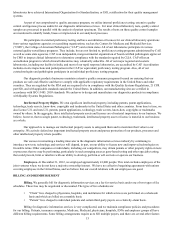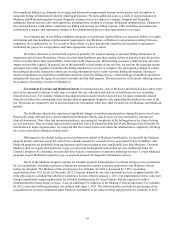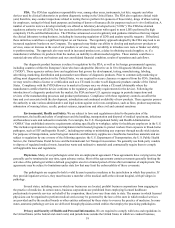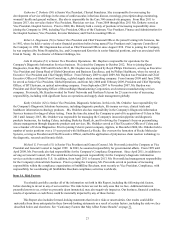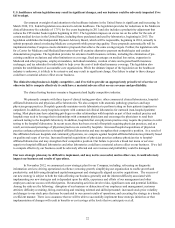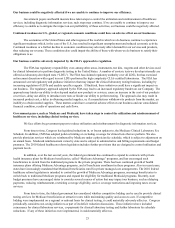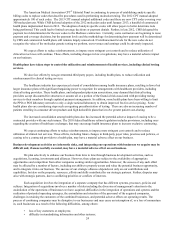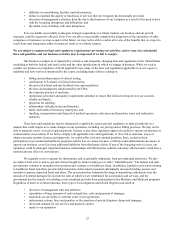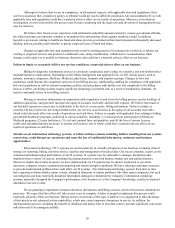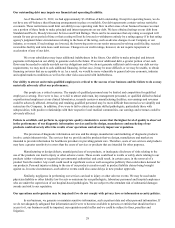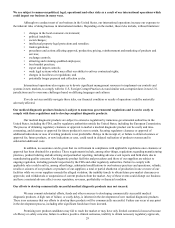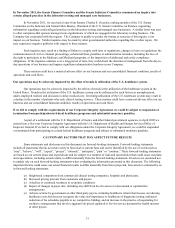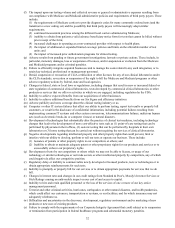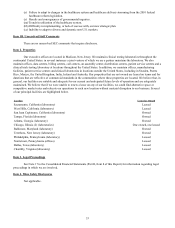Quest Diagnostics 2012 Annual Report Download - page 28
Download and view the complete annual report
Please find page 28 of the 2012 Quest Diagnostics annual report below. You can navigate through the pages in the report by either clicking on the pages listed below, or by using the keyword search tool below to find specific information within the annual report.25
• difficulty in consolidating facilities and infrastructure;
• failure to maintain the quality or timeliness of services that our Company has historically provided;
• diversion of management's attention from the day-to-day business of our Company as a result of the need to deal
with the foregoing disruptions and difficulties; and
• the added costs of dealing with such disruptions.
If we are unable successfully to integrate strategic acquisitions in a timely manner, our business and our growth
strategies could be negatively affected. Even if we are able to successfully complete the integration of the operations of other
companies or businesses we may acquire in the future, we may not be able to realize all or any of the benefits that we expect to
result from such integration, either in monetary terms or in a timely manner.
We are subject to numerous legal and regulatory requirements governing our activities, and we may face substantial
fines and penalties, and our business activities may be impacted, if we fail to comply.
Our business is subject to or impacted by extensive and frequently changing laws and regulations in the United States
(including at both the federal and state levels) and the other jurisdictions in which we engage in business. While we seek to
conduct our business in compliance with all applicable laws, many of the laws and regulations applicable to us are vague or
indefinite and have not been interpreted by the courts, including many of those relating to:
• billing and reimbursement of clinical testing;
• certification or licensure of clinical laboratories;
• the anti-self-referral and anti-kickback laws and regulations;
• the laws and regulations administered by the FDA;
• the corporate practice of medicine;
• operational, personnel and quality requirements intended to ensure that clinical testing services are accurate,
reliable and timely;
• physician fee splitting;
• relationships with physicians and hospitals;
• safety and health of laboratory employees; and
• handling, transportation and disposal of medical specimens, infectious and hazardous waste and radioactive
materials.
These laws and regulations may be interpreted or applied by a prosecutorial, regulatory or judicial authority in a
manner that could require us to make changes in our operations, including our pricing and/or billing practices. We may not be
able to maintain, renew or secure required permits, licenses or any other regulatory approvals needed to operate our business or
commercialize our products. If we fail to comply with applicable laws and regulations, or if we fail to maintain, renew or
obtain necessary permits, licenses and approvals, we could suffer civil and criminal penalties, fines, exclusion from
participation in governmental healthcare programs and the loss of various licenses, certificates and authorizations necessary to
operate our business, as well as incur additional liabilities from third party claims. If any of the foregoing were to occur, our
reputation could be damaged, important business relationships with third parties could be adversely affected and it could have a
material adverse effect on our business.
We regularly receive requests for information, and occasionally subpoenas, from governmental authorities. We also
are subject from time to time to qui tam claims brought by former employees or other “whistleblowers.” The federal and state
governments continue to strengthen their position and scrutiny over healthcare fraud. In addition, legislative provisions relating
to healthcare fraud and abuse provide federal and state enforcement personnel substantially increased funding, powers and
remedies to pursue suspected fraud and abuse. The government has substantial leverage in negotiating settlements since the
amount of potential damages far exceeds the rates at which we are reimbursed for our products and services, and the
government has the remedy of excluding a non-compliant provider from participation in the Medicare and Medicaid programs.
Regardless of merit or eventual outcome, these types of investigations and related litigation can result in:
• diversion of management time and attention;
• expenditure of large amounts of cash on legal fees, costs and payment of damages;
• limitations on our ability to continue some of our operations;
• enforcement actions, fines and penalties or the assertion of private litigation claims and damages;
• decreased demand for our services and products; and/or
• injury to our reputation.


